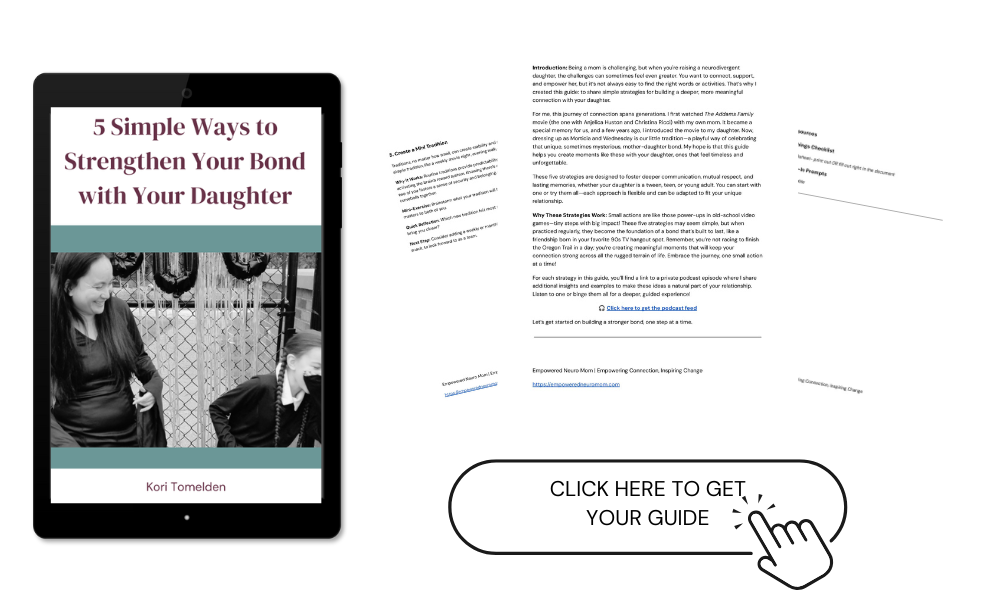Burnout doesn’t just drain your energy—it steals your joy, making even small tasks feel insurmountable. As a neurodivergent mom, you face unique challenges, from managing your own needs to supporting your family through meltdowns, shutdowns, and everything in between. The good news? There are actionable steps you can take to prioritize your well-being and navigate these challenges with grace.
In this post, we’ll explore:
- How to recognize the signs of burnout before they take over.
- Practical self-care strategies tailored to busy moms.
- Techniques for navigating your child’s meltdowns while staying grounded yourself.
Burnout doesn’t have to define your journey. Let’s dive into how you can regain control and create calm in your day-to-day life.
Recognizing Burnout: A Wake-Up Call for Moms
Burnout is more than feeling tired—it’s a state of emotional, physical, and mental exhaustion caused by prolonged stress. For neurodivergent moms, the additional layers of sensory overwhelm, executive dysfunction, and emotional labor can accelerate burnout.
Here are some common signs to look out for:
- Chronic Exhaustion: You wake up tired and struggle to find energy throughout the day.
- Emotional Detachment: You feel disconnected from your family, even though you care deeply about them.
- Reduced Performance: Daily tasks that used to feel manageable now feel impossible.
Recognizing these signs early is key. When you notice burnout creeping in, it’s time to pause, reassess, and take action.
Practical Self-Care Tips: Small Steps, Big Impact
Self-care doesn’t have to be extravagant to be effective. The goal is to integrate small, sustainable practices that help you recharge.
1. Micro-Breaks
Even five minutes can make a difference. Step outside for fresh air, stretch your body, or take a few deep breaths to reset your focus.
2. Mindful Hydration and Nutrition
It’s easy to overlook basic needs when you’re overwhelmed. Start small: drink a glass of water first thing in the morning or keep healthy snacks within reach.
3. Grounding Practices
Mindfulness can be a game-changer. Try grounding exercises like the 5-4-3-2-1 technique:
- Identify 5 things you can see.
- Identify 4 things you can touch.
- Identify 3 things you can hear.
- Identify 2 things you can smell.
- Identify 1 thing you can taste.
These simple actions can help anchor you in the present moment, reducing stress.
Navigating Meltdowns and Shutdowns: A Practical Approach
Your child’s meltdowns or shutdowns can feel overwhelming, but having a plan can make all the difference.
1. Create a Safe Space
Designate an area in your home where your child can decompress. Include items like a weighted blanket, noise-canceling headphones, or fidget toys. A predictable space helps them feel secure during challenging moments.
2. Validate Their Feelings
When your child is in distress, acknowledge their emotions without trying to fix them immediately. Saying something like, “I see you’re feeling really upset right now, and that’s okay,” can help them feel heard.
3. Ground Yourself First
It’s hard to help someone else regulate if you’re overwhelmed. Before responding, take a moment to breathe deeply or step away briefly to regain your composure. Your calm presence will help de-escalate the situation.
Embracing Self-Compassion
One of the hardest parts of motherhood is letting go of the idea that you have to be perfect. Self-compassion is about giving yourself grace, especially when things don’t go as planned.
1. Redefine Success
Celebrate small wins, like taking a moment for yourself or staying patient during a tough situation. Success doesn’t have to mean perfection; it can mean resilience.
2. Reframe Negative Thoughts
When self-doubt creeps in, challenge it. Remind yourself, “I’m doing my best, and that’s enough.”
3. Prioritize Connection Over Perfection
Your kids don’t need a perfect mom—they need a connected one. Showing up, even imperfectly, is what matters most.
Conclusion
Burnout is real, and it’s tough, but it’s not insurmountable. By recognizing the signs, integrating practical self-care strategies, and approaching challenges like meltdowns with empathy and calm, you can reclaim your energy and create a more supportive environment for yourself and your family.
Parenting as a neurodivergent mom comes with unique challenges, but it also comes with unique strengths. You have the power to navigate these moments and come out stronger.
Are you looking for simple, actionable ways to build a stronger connection with your daughter? Download my free guide:
Five Ways to Bond with Your Daughter.
This guide is packed with practical tips to help you create meaningful moments and strengthen your relationship, even on the busiest days.



Comments